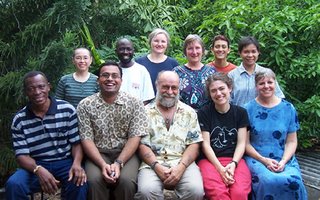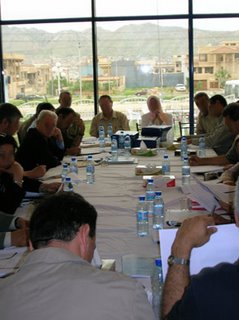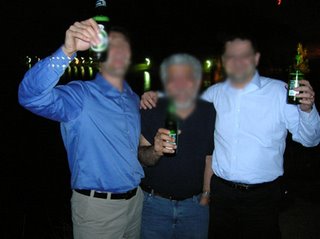Nonviolent Peaceforce Sri Lanka (NPSL)
If you listen to the news, you might have heard about a suicide bomb attack on a military official in Sri Lanka and that the Sri Lankan military has responded with airstrikes against areas controlled by the Liberation Tigers of Tamil Eelam (LTTE) ... the main Tamil military group. This conflict has been going on for (20+ years) and you probably don't hear much about it, nor it's deep roots that date back to the Colonial period of British Ceylon. I'd encourage you to get more than a news snipet about it and read on.
A couple of years ago I was active in an organization called the Nonviolent Peaceforce. They are an international group trying to make a reality of a dream that that Gandhi had of creating a civilian, unarmed peace army that could be utilized in some cases instead of military intervention to a bring conflict to an end. The Peaceforce was designed to build on the work done by many smaller groups such as the Christian Peacemaker Team, Witness for Peace or Peace Brigades International and create a large (2000-member strong), multi-cultural peace force of paid civilian professionals trained in nonviolent conflict intervention. With international support, such a force could be very effective in certain conflict zones.
The Nonviolent Peaceforce is running a pilot project in Sri Lanka, at the request and invitation of local Sri Lankan organizations. Here is their on-the-ground experience with what is happening there right now. Included is a photo of part of the NPSL team.

If you listen to the news, you might have heard about a suicide bomb attack on a military official in Sri Lanka and that the Sri Lankan military has responded with airstrikes against areas controlled by the Liberation Tigers of Tamil Eelam (LTTE) ... the main Tamil military group. This conflict has been going on for (20+ years) and you probably don't hear much about it, nor it's deep roots that date back to the Colonial period of British Ceylon. I'd encourage you to get more than a news snipet about it and read on.
A couple of years ago I was active in an organization called the Nonviolent Peaceforce. They are an international group trying to make a reality of a dream that that Gandhi had of creating a civilian, unarmed peace army that could be utilized in some cases instead of military intervention to a bring conflict to an end. The Peaceforce was designed to build on the work done by many smaller groups such as the Christian Peacemaker Team, Witness for Peace or Peace Brigades International and create a large (2000-member strong), multi-cultural peace force of paid civilian professionals trained in nonviolent conflict intervention. With international support, such a force could be very effective in certain conflict zones.
The Nonviolent Peaceforce is running a pilot project in Sri Lanka, at the request and invitation of local Sri Lankan organizations. Here is their on-the-ground experience with what is happening there right now. Included is a photo of part of the NPSL team.

April 25, 2006
While this report is being prepared, LTTE-controlled sea side areas close to our office in Mutur in the East are being targeted in a coordinated action by the Sri Lankan Navy and Airforce. The bombs and shelling by a naval craft and fighter jets, which can be felt and heard by the team members from their position in the office, are part of a retaliation for the suicide bomb attack on General Fonseka, Chief
Commander of the Sri Lanka Armed Forces, at the army headquarters in Colombo earlier today. Meanwhile, the Airforce has assured us that the Mutur town and our team are safe. The town has lost electricity and reports of casualties from the area targeted are coming in slowly but the exact numbers will not be known until the enforced curfew expires.
It appears the suicide bomb was set-off by a young female, who pretended to be pregnant while visiting the army hospital. Early reports inform us that she threw herself on top of the army vehicle with the General, killing his five body guards and three civilians. Twenty-seven people were injured. The General sustained injuries but miraculously survived. This evening the President of Sri Lanka has appeared on national television and asked the people to remain calm. For the moment, Colombo is under curfew until dawn while the army is conducting house searches
in certain areas.
At the moment, it is difficult to predict what will happen next but the incident definitely has decreased further chances of the talks, which are meant to enforce the current Cease Fire Agreement, in Geneva taking place any time soon. Last week, the LTTE temporarily pulled out of the talks, claiming that a level of normality in the East will need to emerge first.
In recent weeks there have been almost daily attacks on the security forces in the East and North. Some of these have also killed and injured civilians, including two NGO workers killed by a claymore mine attack while passing an army convoy. There have also been shootings, killing and retaliation on civilians for the mine attacks blamed on the LTTE, mob killings, burning of houses and shops, gun fights between partners and displacement of communities.
The worst violence has been seen in the Trincomalee district. The violence included a terrible bomb set off in the busy market on April 12th killing at least five persons, including one child. Within minutes, a Sinhala mob came and targeted revenge at mostly Tamil shops, homes and civilians, leaving at least 19 more civilians dead and over 30 shops burned. The ethnic violence continued in other areas where Sinhalese and Tamil communities border. Thousands of villagers from the areas have moved to public places of worship or schools for safety.
In the context of this tension, after witnessing the aftermath of the bombing of the market and assisting several of the injured people to a hospital, our Trinco Team was attacked by an angry crowd of Sinhala youth while returning to the office. The crowd surrounded the NP vehicle which was marked with the NPSL sign and flag. Members of the crowd slapped and punched the driver, Field Team Member Charles Oloo Otieno, who was trying to turn the vehicle and move away from the hostile scene. Parts of the truck were ripped from the side. The team was also threatened with a hand grenade. Before they could leave from the area heavy stones were thrown at the vehicle, smashing the side and back windows. Luckily the team was not seriously physically injured. However, the whole event took place 30 feet (10 meters) from a police/army checkpoint and the forces present made no attempt to intervene. The team recovered quickly from the attack and continued work the next day, hence it provided protection for the delivery of relief to those displaced by the violence.
Due to the diplomatic skills of its local translator, the team managed to reach out to the gang who had attacked them in the days afterwards. Subsequently, their leaders have apologized to our field team members and agreed to take part in a local peace meeting between the communities soon.
The next 48 hours will tell us more about the situation and whether we can expect a further increase in violence or are faced with a serious war scenario. Questions that need to be answered are: Are today's suicide bombing and the subsequent retaliatory attacks by the armed forces indications that the Cease Fire Agreement is officially dead? Will the EU now decide to ban the LTTE, which the government of Sri Lanka has lobbied for, hence further isola ting the LTTE? How will NPSL operate if war breaks out?
For the moment, we are assessing the situation daily and continue to provide protection to civilians, where possible. But the environment we work in is extremely complex and the circumstances are increasingly more dangerous.
Marcel C.A. Smits, Project Director Nonviolent Peaceforce Sri Lanka


